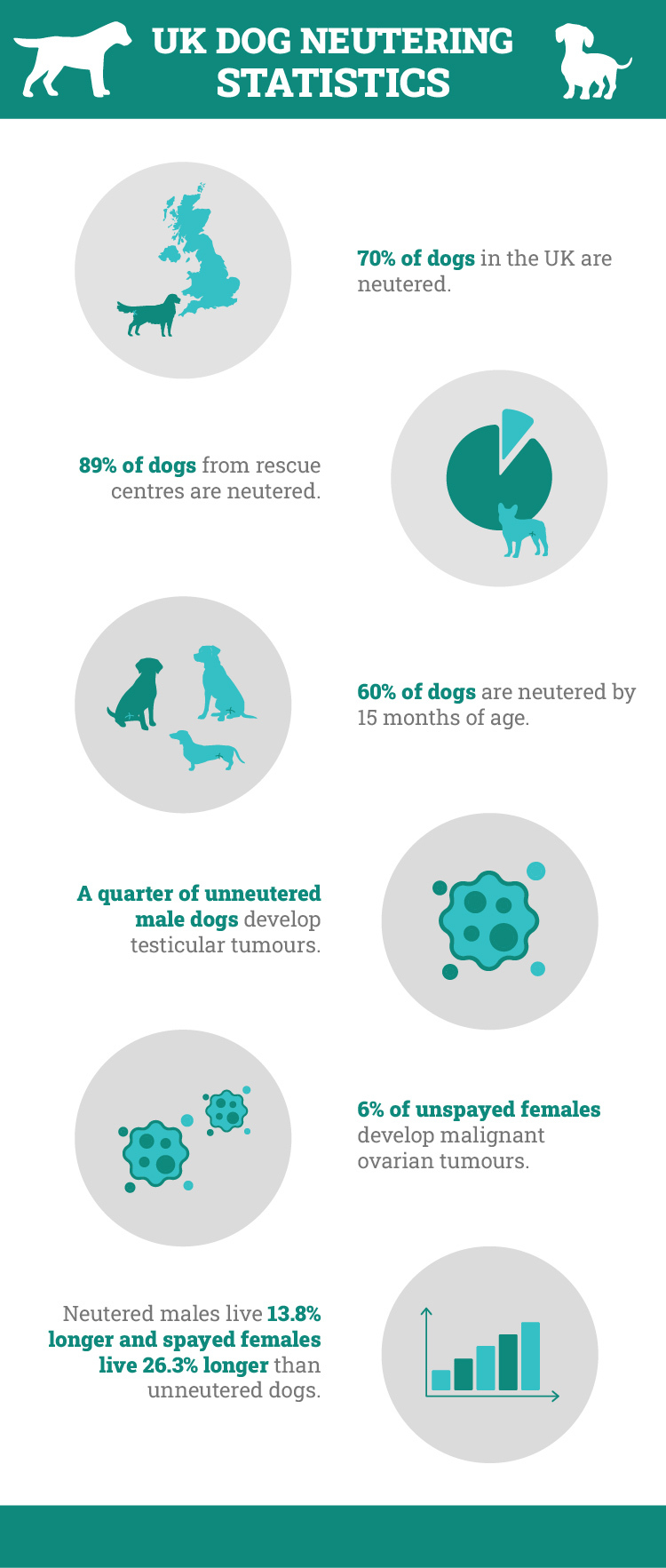In this article
View 3 More +Note: This article’s statistics come from third-party sources and do not represent the opinions of this website.
Neutering dogs helps increase their average lifespan by preventing cancers and other serious health conditions. It can also reduce pet insurance premiums while eliminating the chance of them reproducing. Although the majority of dogs in the UK are neutered, there are still millions of unaltered dogs, with purebred dogs from breeders the most likely to not have the procedure done.
Male dogs undergo castration, which removes the testicles of the dog. Females are spayed: a procedure in which the ovaries and uterus are removed. Both procedures are invasive and will require the dog to have local anaesthetic, as well as an overnight stay at the vet’s, but they can prolong a dog’s life by 3 or 4 years or more.
Below, we look at 12 statistics related to dog neutering in the UK, including looking at which dogs are most likely to have had the procedure, and the benefits associated with both.

The 12 UK Dog Neutering Statistics
- 70% of dogs in the UK are neutered.
- 89% of dogs from rescue centres are neutered.
- Approximately 4 in 5 crossbreeds are neutered.
- Just one in five dogs are neutered by 7 months of age.
- 60% of dogs are neutered by 15 months of age.
- 90% of unneutered females have their first oestrus by 15 months of age.
- A quarter of unneutered male dogs develop testicular tumours.
- 6% of unspayed females develop malignant ovarian tumours.
- Neutered males live 13.8% longer and spayed females live 26.3% longer than unneutered dogs.
- It costs an average of £280 to have a male dog neutered.
- The average cost of spaying a female is £370.
- It costs nearly £100 more to have a large dog neutered, compared to a small dog.


Neutering Statistics
1. 70% of dogs in the UK are neutered.
(PDSA)
There are various benefits to having a dog neutered. It prolongs a pet’s lifetime, prevents them from reproducing, and can even help prevent unwanted behaviours like wandering and even aggression. As such, owners are advised to get their dogs neutered, unless they are using them for breeding.
Approximately 7 in 10 dogs in the UK are neutered, but with a population of 12.5 million dogs, that means that there are still nearly 4 million dogs that have not had the operation.
2. 89% of dogs from rescue centres are neutered.
(PDSA)
When asked, nearly 9 in 10 dog owners who said they got their dogs from rescues and shelters said their pups were neutered. This figure is likely higher than average because a lot of rescues ensure that their animals have the procedure done before they are rehomed.
In those cases where the procedure hasn’t been carried out, some shelters stipulate, as part of the adoption contract, that the operation is done within so many months of taking the pup home. Shelters neuter dogs because it helps keep the population of stray and homeless dogs down.

3. Approximately 4 in 5 crossbreeds are neutered.
(PDSA)
It is also more common for mixed-breed dogs to be neutered, with around 80% of the population of mongrels having had the procedure done. This is because, other than recently developed hybrid dog breeds, crossbreed dogs are relatively inexpensive, which means breeding them for profit is difficult.
And, most buyers that buy from individuals and breeders are looking for purebred pedigree pups.
4. Just one in five dogs are neutered by 7 months of age.
(VetTimes)
Typically, dogs are neutered between the ages of 6 months and 2 years. There have been some links between early neutering of certain breeds and health conditions, but it is important that a dog is neutered before it reaches sexual maturity. Owners should speak to their vet to determine the best age to have the operation done.

Neutering Benefits
5. 60% of dogs are neutered by 15 months of age.
(VetTimes)
Dogs reach sexual maturity at different ages according to their breed and size. Even dogs of the same breed can reach maturity at different ages. However, it is generally recognised that dogs will start to reach sexual maturity at around 8 or 9 months of age.
Having your dog neutered by this age can help prevent behavioural problems and will prevent your dog from getting pregnant or getting other dogs pregnant, which is especially important in a multi-dog household but is also important in other families.
Only 6 in 10 dogs are neutered by the time they reach 15 months of age: by which time, most will be sexually mature and capable of reproducing.

6. 90% of unneutered females have their first oestrus by 15 months of age.
(BVA Journals)
The vast majority of unneutered females have their oestrus cycle by the time they reach 15 months of age, and it is possible for them to become pregnant during their first cycle. Owners who have not had their dogs neutered by the time they do have their first heat will need to keep a close eye on their dogs when they are around males.
7. A quarter of unneutered male dogs develop testicular tumours.
(Embrace Pet Insurance)
As well as preventing unwanted litters, neutering dogs also helps minimise the risk of them developing certain cancers and other conditions. For male dogs, the biggest health benefit is that it prevents the development of testicular cancers.
Studies show that a quarter of all dogs that have not been neutered do develop tumours of the testicle or testicles.
8. 6% of unspayed females develop malignant ovarian tumours.
(VCA Hospitals)
Malignant ovarian tumours can include teratomas, carcinomas, and adenocarcinomas. The spaying process means that bitches undergo ovariohysterectomy, which removes the ovaries and prevents these tumours altogether.
In those female dogs that are not spayed, such tumours occur in just over 6% of dogs. Treatment for these tumours might be possible, but not if they have spread, and they can prove fatal.

9. Neutered males live 13.8% longer and spayed females live 26.3% longer than unneutered dogs.
(Humane Society)
Neutering reduces the chances of cancers and other conditions. It can also prevent pet dogs from running away and improve behavioural issues. This leads to a longer lifespan for those dogs that have been neutered, especially females. Males live 13.8% longer while females live 26.3% longer if they are neutered.
Considering an average life expectancy of around 12 years, this means that males will live approximately 18 months longer, while females will live, on average, three years longer if they are neutered. Neutered dogs can also suffer fewer illnesses which means they will lead a happier, healthier life, although this obviously varies from one dog to the next.

Neutering Costs
10. It costs an average of £280 to have a male dog neutered.
(ManyPets)
Dog neutering is not covered by insurance policies, but it can usually be done by a local vet. You don’t have to take the dog to a specialist or an animal hospital to have the procedure. For male dogs, neutering means castration. The dog will be anaesthetised for the procedure, and once they’re under, the vet will remove the testicles.
The vet will sometimes keep the dog overnight or for a couple of nights so they can monitor progress and ensure that the dog goes to the toilet and doesn’t have any kind of negative reaction to the drugs used during the procedure.
Costs vary according to region, size of the dog, and the vet that you use, but the average cost of this procedure is £280.

11. The average cost of spaying a female is £370.
(ManyPets)
Female dogs have a spaying procedure. Like male dogs, they need to be anaesthetised for the operation, but spaying is more complicated than castration. As such, it will usually take longer and there is a greater chance of complications, although these are still rare.
Again, costs vary according to factors like size and even the age of the dog, but the average cost of having a female spayed is £370.
12. It costs up to £100 more to have a large dog neutered, compared to a small dog.
(ManyPets)
Bigger dogs require more anaesthetic, and it can take longer for the operation. They also need more space if they need to be kept overnight. As such, it costs more to have large and giant breeds neutered than it does smaller dogs.
Spaying small male dogs, which are those that weigh less than 25 kilograms, costs £250, on average, while big dogs cost an average of £315 for the procedure. For female dogs, the cost is £325 for small dogs and £415 for large breeds.


Frequently Asked Questions (FAQ)
Do you legally have to have your dog neutered?
There is no law in the UK that demands dogs be neutered, except for XL Bully breeds. All Bullies must be neutered: a law introduced by the government to stop them breeding and to prevent more of these dogs from entering the population.
The dog’s owner is responsible for arranging for the neutering and must pay all the costs associated with the procedure. No other breeds have to be neutered.
Is neutering a painful procedure?
During the neutering procedure, your dog will be asleep and will not feel anything. When they come around, they will be on strong pain medication to help manage the pain, and owners are given instructions on how to ensure pain and discomfort are kept to a minimum.
However, some discomfort is to be expected in the days and weeks following the neutering operation because it is an invasive procedure.
How long does neutering take?
The procedure itself is surprisingly quick. A male dog can be neutered in less than half an hour while spaying a female can take an hour or more because it is a more delicate and difficult operation.
Females will usually be kept overnight following the procedure, but male dogs can be sent home on the day of the operation in most cases. Similarly, recovery time is longer for females, with most recovering in around 10 days. Males can be back to their old selves in 5 days to a week.

Is neutering covered by insurance?
Routine and elective procedures are not usually covered by insurance. Insurance typically covers emergencies and injuries. However, there are some wellness plans and funds that can help reduce the cost, and some veterinary surgeries will offer repayment plans and monthly payments to help spread the cost of the procedure.
Ask your vet if you want to inquire about spreading the cost of neutering.
If you need to speak with a vet but can't get to one, head over to PangoVet. It's our online service where you can talk to a vet online and get the advice you need for your dog — all at an affordable price!

Does neutering change a dog’s behaviour?
Neutering can change a dog’s behaviour, although the extent of the changes will depend on the age of the dog when the procedure is carried out, as well as their character before the neutering takes place.
It usually has more of a behavioural effect on males and can reduce aggression and wandering. It should also stop a male dog from marking and scenting. Females can undergo some similar behavioural changes, although the difference is not usually as great.

Conclusion
Apart from very specific cases, it is not a legal requirement to have dogs neutered in the UK. However, it does prevent unwanted pregnancies, can prolong the life of dogs by preventing the development of certain cancers, and can, in some cases, improve a dog’s behaviour.
The procedure generally costs around £300 with females costing more than males, and while a dog might be kept overnight, some male dogs return home on the day of the procedure. Recovery takes between 5 days and 10 days, and it is best to have dogs neutered before they reach sexual maturity, which occurs at around 8 months of age for most breeds and dogs.


















